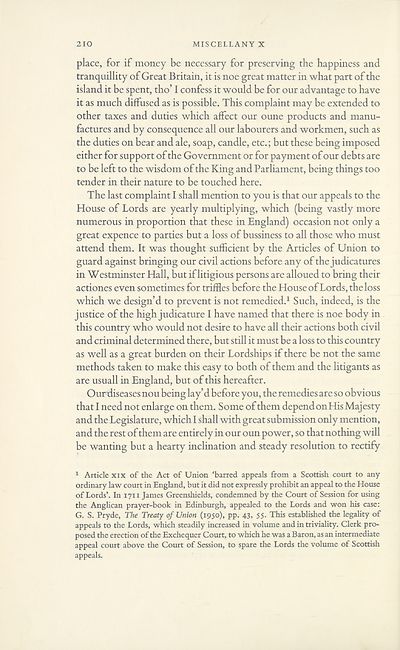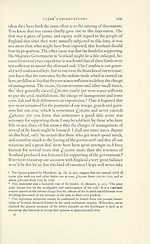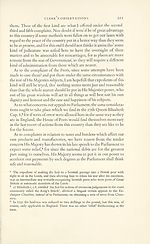Series 4 > Miscellany of the Scottish History Society
(235) Page 210
Download files
Complete book:
Individual page:
Thumbnail gallery: Grid view | List view

210
MISCELLANY X
place, for if money be necessary for preserving the happiness and
tranquillity of Great Britain, it is noe great matter in what part of the
island it be spent, tho’ I confess it would be for our advantage to have
it as much diffused as is possible. This complaint may be extended to
other taxes and duties which affect our oune products and manu¬
factures and by consequence all our labourers and workmen, such as
the duties on bear and ale, soap, candle, etc.; but these being imposed
either for support of the Government or for payment of our debts are
to be left to the wisdom of the King and Parliament, being things too
tender in their nature to be touched here.
The last complaint I shall mention to you is that our appeals to the
House of Lords are yearly multiplying, which (being vastly more
numerous in proportion that these in England) occasion not only a
great expence to parties but a loss of bussiness to all those who must
attend them. It was thought sufficient by the Articles of Union to
guard against bringing our civil actions before any of the judicatures
in Westminster Hall, but if litigious persons are alloued to bring their
actiones even sometimes for triffles before the Houseof Lords, the loss
which we design’d to prevent is not remedied.1 Such, indeed, is the
justice of the high judicature I have named that there is noe body in
this country who would not desire to have all their actions both civil
and criminal determined there, but still it must be a loss to this country
as well as a great burden on their Lordships if there be not the same
methods taken to make this easy to both of them and the litigants as
are usuall in England, but of this hereafter.
Oundiseases nou being lay’d before you, the remedies are so obvious
that I need not enlarge on them. Some of them depend on His Majesty
and the Legislature, which I shall with great submission only mention,
and the rest of them are entirely in our oun power, so that nothing will
be wanting but a hearty inclination and steady resolution to rectify
1 Article xix of the Act of Union ‘barred appeals from a Scottish court to any
ordinary law court in England, but it did not expressly prohibit an appeal to the House
of Lords’. In 1711 James Greenshields, condemned by the Court of Session for using
the Anglican prayer-book in Edinburgh, appealed to the Lords and won his case:
G. S. Pryde, The Treaty of Union (1950), pp. 43, 55. This established the legality of
appeals to the Lords, which steadily increased in volume and in triviality. Clerk pro¬
posed the erection of the Exchequer Court, to which he was a Baron, as an intermediate
appeal court above the Court of Session, to spare the Lords the volume of Scottish
appeals.
MISCELLANY X
place, for if money be necessary for preserving the happiness and
tranquillity of Great Britain, it is noe great matter in what part of the
island it be spent, tho’ I confess it would be for our advantage to have
it as much diffused as is possible. This complaint may be extended to
other taxes and duties which affect our oune products and manu¬
factures and by consequence all our labourers and workmen, such as
the duties on bear and ale, soap, candle, etc.; but these being imposed
either for support of the Government or for payment of our debts are
to be left to the wisdom of the King and Parliament, being things too
tender in their nature to be touched here.
The last complaint I shall mention to you is that our appeals to the
House of Lords are yearly multiplying, which (being vastly more
numerous in proportion that these in England) occasion not only a
great expence to parties but a loss of bussiness to all those who must
attend them. It was thought sufficient by the Articles of Union to
guard against bringing our civil actions before any of the judicatures
in Westminster Hall, but if litigious persons are alloued to bring their
actiones even sometimes for triffles before the Houseof Lords, the loss
which we design’d to prevent is not remedied.1 Such, indeed, is the
justice of the high judicature I have named that there is noe body in
this country who would not desire to have all their actions both civil
and criminal determined there, but still it must be a loss to this country
as well as a great burden on their Lordships if there be not the same
methods taken to make this easy to both of them and the litigants as
are usuall in England, but of this hereafter.
Oundiseases nou being lay’d before you, the remedies are so obvious
that I need not enlarge on them. Some of them depend on His Majesty
and the Legislature, which I shall with great submission only mention,
and the rest of them are entirely in our oun power, so that nothing will
be wanting but a hearty inclination and steady resolution to rectify
1 Article xix of the Act of Union ‘barred appeals from a Scottish court to any
ordinary law court in England, but it did not expressly prohibit an appeal to the House
of Lords’. In 1711 James Greenshields, condemned by the Court of Session for using
the Anglican prayer-book in Edinburgh, appealed to the Lords and won his case:
G. S. Pryde, The Treaty of Union (1950), pp. 43, 55. This established the legality of
appeals to the Lords, which steadily increased in volume and in triviality. Clerk pro¬
posed the erection of the Exchequer Court, to which he was a Baron, as an intermediate
appeal court above the Court of Session, to spare the Lords the volume of Scottish
appeals.
Set display mode to:
![]() Universal Viewer |
Universal Viewer | ![]() Mirador |
Large image | Transcription
Mirador |
Large image | Transcription
Images and transcriptions on this page, including medium image downloads, may be used under the Creative Commons Attribution 4.0 International Licence unless otherwise stated. ![]()
| Scottish History Society volumes > Series 4 > Miscellany of the Scottish History Society > (235) Page 210 |
|---|
| Permanent URL | https://digital.nls.uk/126695703 |
|---|
| Description | Over 180 volumes, published by the Scottish History Society, containing original sources on Scotland's history and people. With a wide range of subjects, the books collectively cover all periods from the 12th to 20th centuries, and reflect changing trends in Scottish history. Sources are accompanied by scholarly interpretation, references and bibliographies. Volumes are usually published annually, and more digitised volumes will be added as they become available. |
|---|


